How and with what can you clean a kitchen apron from grease?
It is not so easy to quickly and thoroughly remove traces of grease from a kitchen apron made of tiles or plastic. Aggressive products can ruin the texture of the surface, and household chemicals that are too mild will not give the desired result. The most difficult area to work with is the area above the stove; in this part of the kitchen the fat is dense, melted, and rancid.
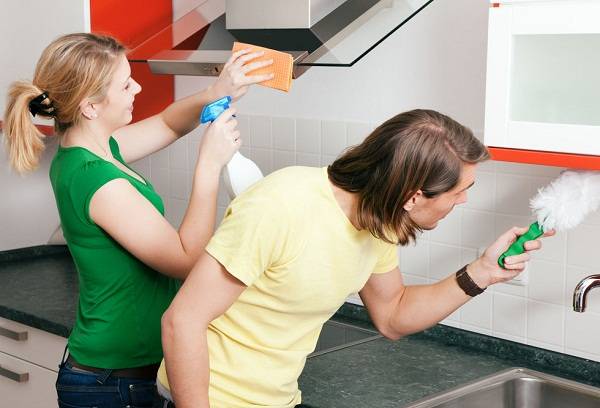
Rules for cleaning a kitchen apron that increase the efficiency of the approach
The effectiveness of the products used will increase many times over, and the result will be obtained with the least effort if you follow the following rules for processing an apron in the kitchen:
- The work will go faster if you first slightly warm up the selected product, especially if it is prepared independently from natural ingredients. If you need to clean a plastic surface, you first need to make sure that the composition will not remove part of the material in addition to grease.
Tip: Cleaning an apron in the kitchen is not the most pleasant thing due to the variety of strong aromas. To avoid suffering from watery eyes, sneezing and other signs of irritation of the mucous membranes, you must first ventilate the room and do not close the window during manipulations. A hood, no matter how powerful it is, will not cope with such a strong smell.
- The easiest way to wash off grease is with a sponge. Regular rags will be ineffective, metal mesh will damage the surface. The sponge also should not be dense; even a regular dishwashing utensil will cope with the task without any problems.
- An apron covered with a thick layer of fat is recommended to be steamed first. If it is tile, you can place an oblong container of boiling water at the base of the masonry for a few minutes. It is better to treat plastic surfaces locally, using the spout of a kettle with hot water.
- If the chosen product does not help and you need to use another product, you first need to wash the material from the remnants of the previous chemical, otherwise reactions may begin that will lead to damage to the surface.
- It is strictly forbidden to mix several folk remedies or household chemical products at once in order to increase their effectiveness. A positive result is not guaranteed, and it is quite possible to permanently ruin an apron in the kitchen.
Folk remedies are considered universal; they can be used to treat surfaces made of plastic, tile and stone. Household chemicals can be highly specialized, so you should carefully read the label before using them.
Folk remedies to combat stubborn stains
Just a few years ago, to wash stubborn grease stains on work and decorative surfaces in the kitchen, housewives used fairly cheap improvised ingredients. Their effectiveness and availability are so high that even today many women prefer to turn to folk remedies rather than purchase drugs with questionable composition.
- Mustard powder. To clean a not very dirty plastic or tile surface, you need to apply dry powder to problem areas with a damp sponge, leave for a few minutes and wipe off the product along with the grease. If the situation is more complicated, you will have to prepare a concentrated solution of dry mustard and warm water.You need to wear gloves when working, or you can burn your hands.
- Rice water. The liquid that remains after cooking rice or rinsing the boiled product does an excellent job of removing fresh stains. It is best to use it warm; after treatment, you must thoroughly wash the apron with clean water, otherwise whitish stains may appear.
- Lemon acid. Allows you not only to clean the tiles, but also disinfects, bleaches, and degreases the surface. It can be used dry, but you will first have to moisten the oily area with warm water. The most effective approach is to use a paste made from citric acid and a small amount of boiled (then there will be no scale) water. It is better not to use such an aggressive component for processing plastic.
- Vinegar. Not the most pleasant product to use, but a very effective product in the fight against fat. For minor contamination, it is better to first dilute it with boiled water. If the stains are persistent, then take the composition concentrated and preheated to a very warm state.
- Soap solution. A concentrated soap solution is equally effective when working with traces of grease on any surface. It is best to put a little laundry soap into a bowl, dilute it with water and rub the problem areas with the resulting mixture until grease stains and streaks are completely removed.
- Baking soda. The best option for cleaning plastic aprons. We work with it in the same way as with mustard. We wet the work area with warm water, apply dry powder, wait five minutes and wipe off the stains.
- Clay. Mixed with vinegar, the product allows you to wash your tile backsplash in a matter of minutes, eliminating all traces of yellowness, scale or smudges.To obtain optimal results, the clay must be sifted and diluted with vinegar to obtain a homogeneous paste. After cleaning, the surface should be thoroughly rinsed and dried with towels.
When putting things in order in the kitchen, it is recommended to use the listed products first. Their vapors quickly disappear, so the risk of contamination of food with particles of detergents or their penetration into the skin and mucous membranes is minimal.
Features of the use of household chemicals when processing tile and plastic products
Few people know, but most industrial household chemicals are unsuitable for treating stubborn stains in the form of grease stains. With their help, you can easily wash off fresh formations, but they will simply spread plaque that has accumulated for several days or even weeks over an even larger area. It is especially dangerous to use them to neutralize problems on the surface of plastic.
It happens that the material has already begun to deteriorate, and fat still covers the surface in places. To avoid making a serious mistake, you should take into account the recommendations on the packaging. If the product needs to be applied to a sponge and treated with a surface, then its composition is obviously too aggressive and must be used to clean stone or tiles. If it is indicated that it is better to distribute the mass over the surface, then it can be used without fear on any materials.
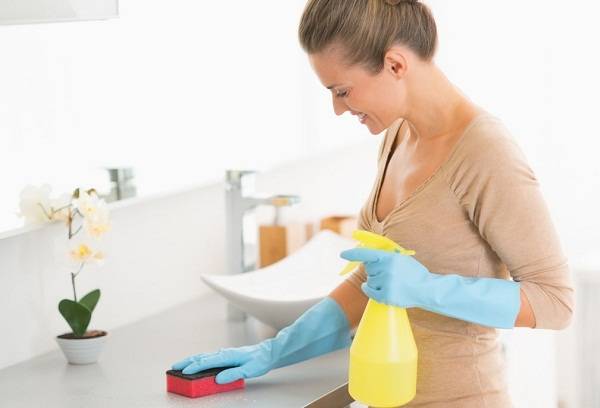
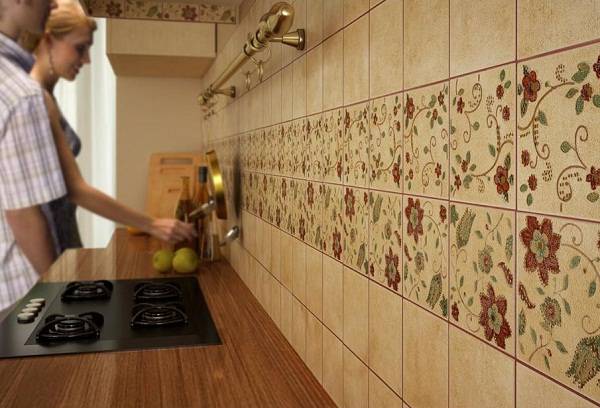
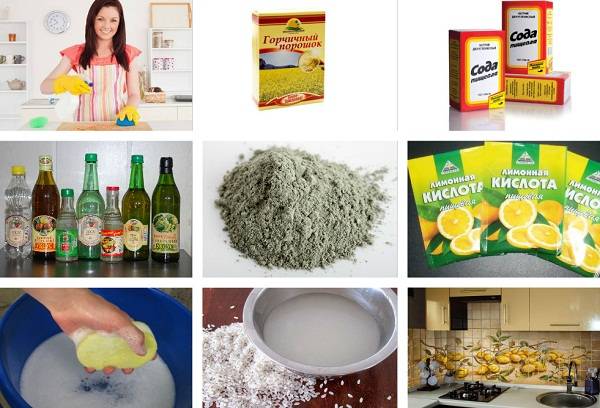
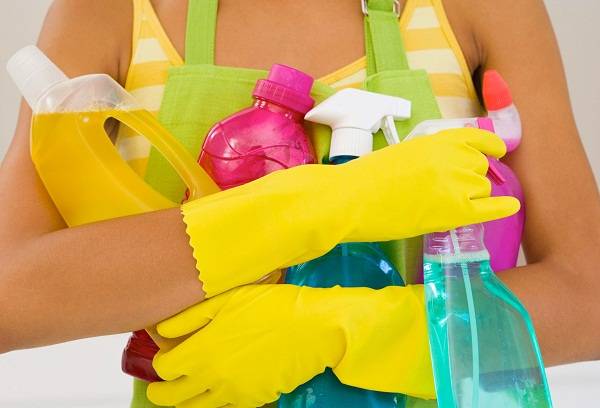
I wiped off all the grease with a sponge and vinegar. Great way